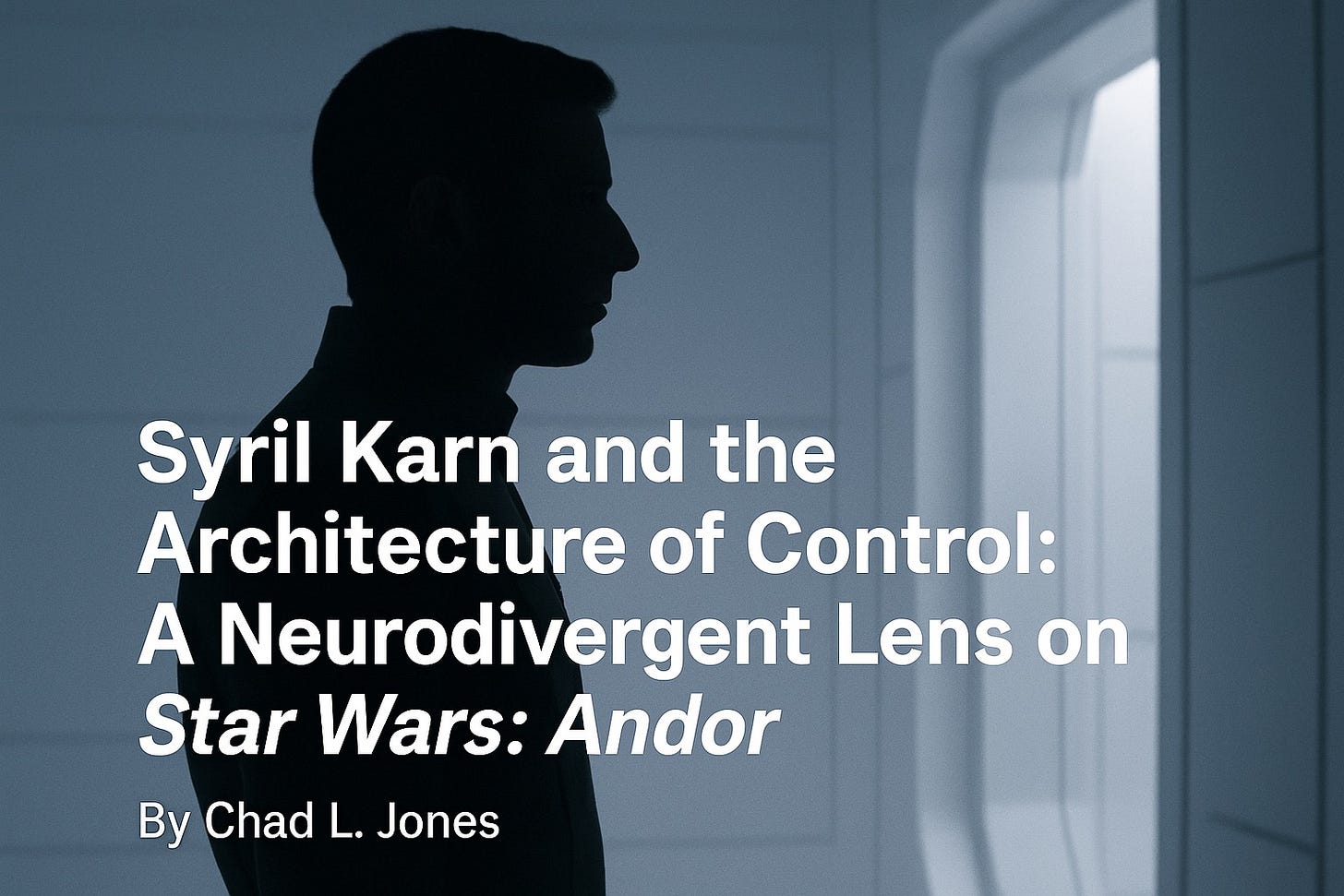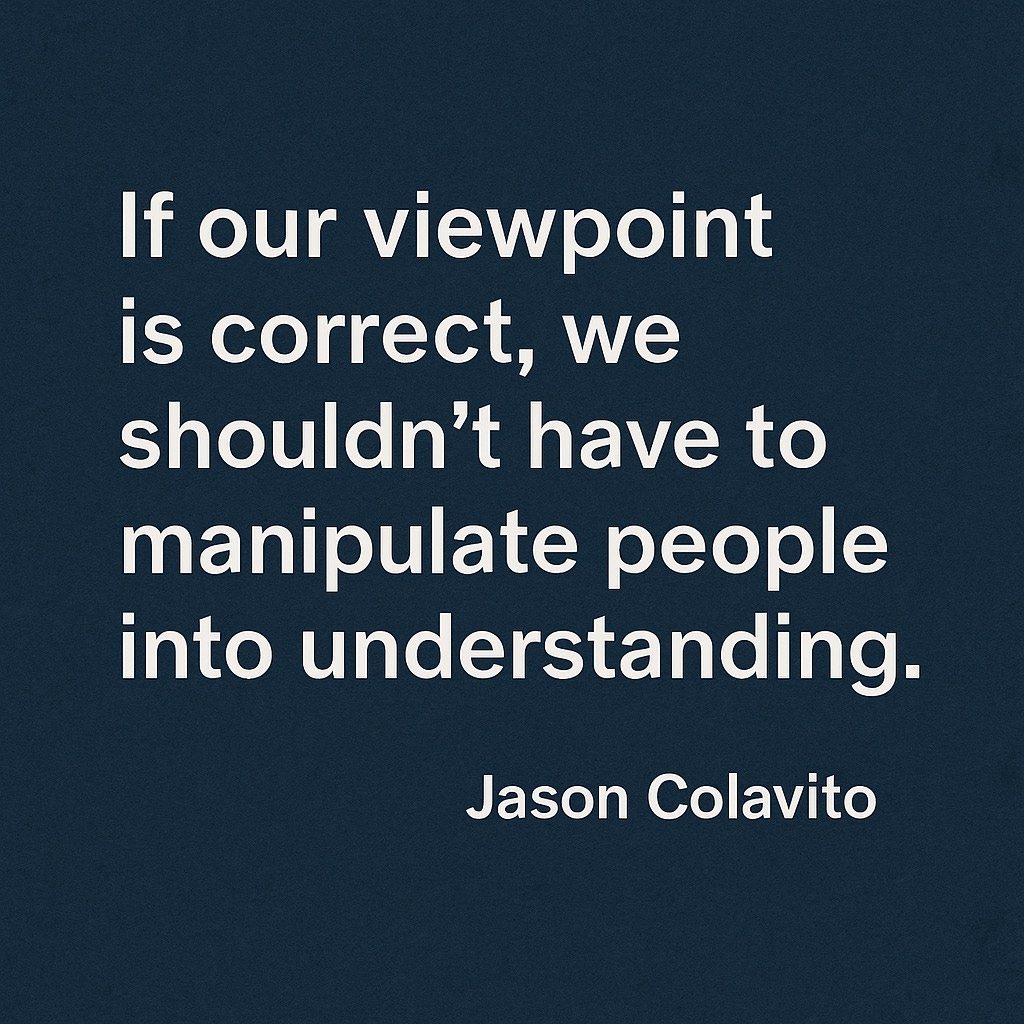Syril Karn and the Architecture of Control: A Neurodivergent Lens on Star Wars: Andor
Syril Karn and the Architecture of Control: A Neurodivergent Lens on Star Wars: Andor
How a minor character quietly became one of the most emotionally complex—and neurodivergent-coded—figures in the Star Wars canon.
By Chad L. Jones | May 2025
In Andor, Syril Karn is the kind of character who, at first glance, seems almost pitiful: rigid, awkward, obsessive, and largely powerless. But across the arc of the show, something remarkable happens. He becomes a mirror—one reflecting the inner lives of those of us who’ve clung to rules not for power, but for protection. For predictability. For survival.
This isn’t your average Star Wars morality tale. Andor is nuanced, politically charged, and grounded in the gray. And nowhere is that more apparent than in the subtle unraveling of Syril Karn.
The Neurodivergent Reading
While not explicitly stated, many traits suggest Syril is neurodivergent-coded:
Hyper-focus: His relentless pursuit of Cassian Andor isn’t just persistence—it borders on obsession, driven by a moral imperative.
Rule adherence: Syril doesn’t see bureaucracy as red tape—it’s sacred scaffolding.
Social dissonance: He struggles with unspoken social rules, misreading cues, and clinging to formality even in distress.
Muted emotional expressiveness: His affect is flat, yet emotionally charged—his turmoil all internal.
Syril isn’t a caricature; he’s a study in internal conflict. And actor Kyle Soller deserves credit for that delicate performance—conveying volumes with a twitch of the jaw, a pause, a blink held just too long.
Spoiler Warning: Episode 4–5
.
.
.
The Ghorman Raid: When the System Shows Its Teeth
It’s not a dramatic monologue or some revelatory breakdown that begins Syril’s transformation—it’s silence.
Watching the Ghorman raid unfold, he doesn’t cry out or rebel. He watches. But in his stillness is something louder: the beginning of doubt. For someone who once saw the Empire’s machinery as righteous, this moment cracks the casing. It’s the look of a man beginning to suspect that his loyalties may not be aligned with justice after all.
Spoiler Warning: Episode 7–8
.
.
.
The Corridor: A Relational Pivot, Not a Romance
Much has been made of Syril’s interaction with ISB supervisor Dedra Meero in the stark white corridor. Some saw romantic tension. Others saw pathology.
But what many neurodivergent viewers saw was something else entirely: a plea for recognition. Not love. Not even career advancement. Just the desperate need to be seen by someone who might understand.
Dedra doesn’t. She recoils—not just physically, but ideologically. She’s playing the game of power. Syril is still clinging to the rulebook. And in that moment, we see that while they may share tactics, they no longer share purpose.
Spoiler Warning: Episode 9
.
.
.
The Slap: When Truth Collides with Self-Deception
One of the most searing moments in Syril’s downward spiral comes not through warfare or politics, but a simple street-level interaction. When confronted by a woman who clearly sees the Empire’s cruelty for what it is, Syril offers what he believes to be a solution: blame the uprisings on outside agitators.
To him, it’s strategic narrative control. A way to restore order through optics. But to her, it’s a betrayal. A gaslighting of lived truth. A cowardly rewriting of cause and effect.
And so, she slaps him. Not in melodrama, but in heartbreak.
Because in that moment, Syril reveals he would rather cling to the system than confront its rot. Rather preserve the illusion of order than face the pain of moral collapse. He chooses control over truth.
It’s here, perhaps more than anywhere, that the audience sees the full measure of Syril’s dissonance. He means well. But he is not well. And the system he serves is not worthy of the ideals he projects onto it.
The Tragedy and the Possibility
Syril’s arc is a tragedy—not because he becomes evil, or dies, or redeems himself—but because his inner world is never acknowledged. He is invisible to both the machine he serves and the rebellion he inadvertently aids.
But perhaps there’s possibility in that.
Maybe Syril will forge a third path. One that doesn’t require abandoning his sense of justice, but reframing it beyond the Empire’s terms. One that honors structure and empathy. Logic and humanity.
For neurodivergent viewers—especially those who have wrestled with rigid systems that punish authenticity—Syril Karn isn’t a villain or a failure.
He’s a reflection. A question. And maybe even a quiet form of hope.


